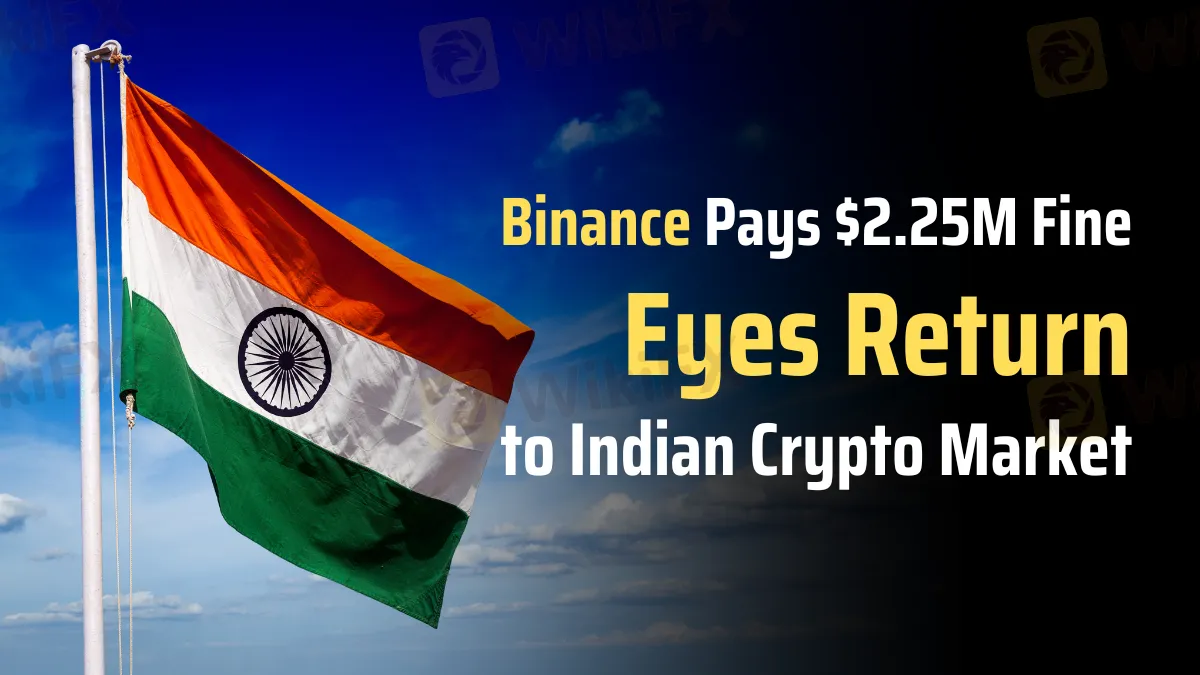简体中文
繁體中文
English
Pусский
日本語
ภาษาไทย
Tiếng Việt
Bahasa Indonesia
Español
हिन्दी
Filippiiniläinen
Français
Deutsch
Português
Türkçe
한국어
العربية
Binance Pays $2.25M Fine, Eyes Return to Indian Crypto Market
Abstract:Binance fined $2.25M by India's FIU for AML violations, seeks re-entry into the Indian market after a regulatory overhaul.

Binance, the world's biggest cryptocurrency exchange by trading volume, is preparing to re-enter the Indian market after being fined 188.2 million rupees (about $2.25 million) by India's Financial Intelligence Unit (FIU). The penalties were levied in response to breaches of India's anti-money laundering (AML) legislation.
In December of last year, the Indian FIU barred access to Binance and eight other international Bitcoin exchanges. This action compelled technology behemoths Apple and Google to ban local access to these exchanges from their app stores. Under Indian law, bitcoin exchanges must register with the FIU as reporting organizations and follow local AML laws. This includes withholding tax on cryptocurrency transactions and earnings.
Binance, which had made no formal comments on its re-entry, apparently intended to resume operations in India by paying the imposed penalty. In May, the exchange finalized its registration with the FIU, which was a critical step for restarting business in the nation. Among the other banned exchanges, the Seychelles-based KuCoin was the quickest to comply with Indian rules, paying a 3.45 million rupee penalty within a month after the crackdown.

The Indian fine is not an unusual event for Binance. The exchange has experienced worldwide regulatory problems. In May, Binance was fined $4.38 million by Canada's anti-money laundering agency for breaking local AML regulations. Binance contested the penalties, claiming that it did not target Canadian citizens. Coincidentally, the exchange has declared intentions to quit the Canadian market in May 2023.
Binance's regulatory issues are particularly severe in the United States. The exchange settled with the Justice Department for $4.3 billion and paid an extra $2.85 billion to the US commodities regulator. Changpeng Zhao, former CEO, pleaded guilty to breaking the Bank Secrecy Act and received a four-month prison term. Binance.US, the US subsidiary, has lost its money-transmitting license in seven states and halted new onboarding in Connecticut, Georgia, Ohio, Minnesota, and Washington.
Read more:
As Binance navigates these legal obstacles, re-entering India is a crucial step in its ambitions to stabilize and grow its worldwide business. However, it is unclear when the exchange will restart services in the nation.
Explore WikiFX for in-depth information about global cryptocurrency exchanges such as Binance. Make educated trading choices by reviewing thorough regulatory information, user reviews, and market research. Stay up to speed with WikiFX to traverse the ever-changing universe of digital assets with security and confidence.

Disclaimer:
The views in this article only represent the author's personal views, and do not constitute investment advice on this platform. This platform does not guarantee the accuracy, completeness and timeliness of the information in the article, and will not be liable for any loss caused by the use of or reliance on the information in the article.
Read more

Anti-Scam Groups Urge Tougher Action on Fraudsters in UK
Anti-scam groups demand tougher police action on fraudsters as UK fraud rates surge 19%, targeting millions in a penalty-free crime spree exposed by a $35m scam leak.

Philippines Deports 29 Indonesians Linked to Online Scam Syndicate in Manila
Online scam groups in the Philippines trick Filipinos into gambling and love scams, from Manila to Bacolod, causing trafficking and pain as police fight back.

How Reliable Are AI Forex Trading Signals From Regulated Brokers?
Discover how reliable AI Forex trading signals are and why using a regulated broker boosts their effectiveness. Learn key factors to evaluate accuracy and enhance your trading.

Top Currency Pairs to Watch for Profit This Week - March 31, 2025
Discover the top 5 currency pairs to trade for profit this week, March 31, 2025—USD/JPY, EUR/USD, GBP/USD, AUD/USD, USD/CHF—with simple strategies and best times.
WikiFX Broker
Latest News
How Crypto Trading Transforms FX and CFD Brokerage Industry
FCA Warns Against 10 Unlicensed or Clone Firms
CySEC Warns Against 14 Unlicensed Investment Websites
Top Currency Pairs to Watch for Profit This Week - March 31, 2025
Will natural disasters have an impact on the forex market?
Philippines Deports 29 Indonesians Linked to Online Scam Syndicate in Manila
Exposed: Deceptive World of Fake Trading Gurus – Don’t Get Fooled!
AI-Powered Strategies to Improve Profits in Forex Trading
Stock Market Trading Volume Drops by 97.58 Billion Naira This Month
Why does your mood hinder you from getting the maximum return from an investment?
Currency Calculator








